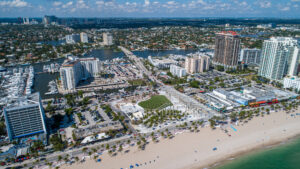Writer: Catie Schwartzman
 2 min read February 2021 — This year’s spring break will prove to be a unique challenge for South Florida. Though the COVID-19 rollout is in progress, hordes of college students congregating in Fort Lauderdale and Miami’s beaches bring potential business as well as potential coronavirus spread.
2 min read February 2021 — This year’s spring break will prove to be a unique challenge for South Florida. Though the COVID-19 rollout is in progress, hordes of college students congregating in Fort Lauderdale and Miami’s beaches bring potential business as well as potential coronavirus spread.
The spring break of 2020 took place on the cusp of the COVID-19 lockdown. A year later, there is the additional risk of the new U.K. COVID-19 variant, which accounted for up to 15% of the new COVID-19 cases in Florida in recent weeks. In Fort Lauderdale, regulations in place to mitigate the spread include Fort Lauderdale’s enforcement of no alcohol, tents or canopies on the beach. Furthermore, this year Fort Lauderdale introduced barricades along State Road A1A and a designated pick-up and drop-off area for rideshare drivers at Las Olas Oceanside Park at 3000 East Las Olas Boulevard. Citations may be issued to those who disobey.
Additional regulations within Broward County are motorized scooters and other dockless vehicles being prohibited from Feb. 28 to April 18 on the barrier island and live and amplified music being limited on beach property in certain areas.
Mayor of the City of Fort Lauderdale Dean Trantalis has been faced with the challenge of balancing economic growth and development with a safe environment for both visitors and inhabitants over the course of the year.
“We realized throughout this pandemic that there needs to be a balance between saving people’s lives and protecting livelihoods,” said Trantalis in conversation with Invest:. “That balance proved to be an experiment because no one has really had experience with dealing with such a pandemic, especially in a community such as ours that has extremely transient factors, with millions of visitors coming here every year, meaning diseases can spread much easier as a result.”
Similarly, Steve Geller, mayor of Broward County, is discouraging students from spring break travel to the region.
“The county is not promoting Spring Break. It’s a bad idea,” said Geller to the Sun Sentinel.
Geller and others have participated in discussions of a curfew or potential beach closings if crowds during spring break become too large and dense.
However, bars and restaurants are allowed to operate at full capacity with tables 6 feet apart and mask and social distancing rules in place, in which case an approved curfew would come into effect.
The hospitality industry has been hurting throughout the COVID-19 pandemic. An influx of paying customers into the area looking for sunshine and sand will bring revenue to many Fort Lauderdale hotels in addition to restaurants. Heiko Dobrikow, general manager of the Riverside Hotel and Executive Vice President of the Las Olas Company, discussed the state of the industry and the allure of beachside properties to travelers in a conversation with Invest:.
“The recovery for our hotels has been super slow, and when you take a look at our county, you have the beach, the city and then the west,” said Dobrikow. “The beach properties have recovered a little bit better than the city hotels, and even better than out west. The reason is that everybody wants to have that al fresco experience.”
Greater Fort Lauderdale awaits the influx of spring break tourists with anticipation and preparedness for what that may bring.
For more information, visit:
https://www.fortlauderdale.gov/
https://www.riversidehotel.com/
